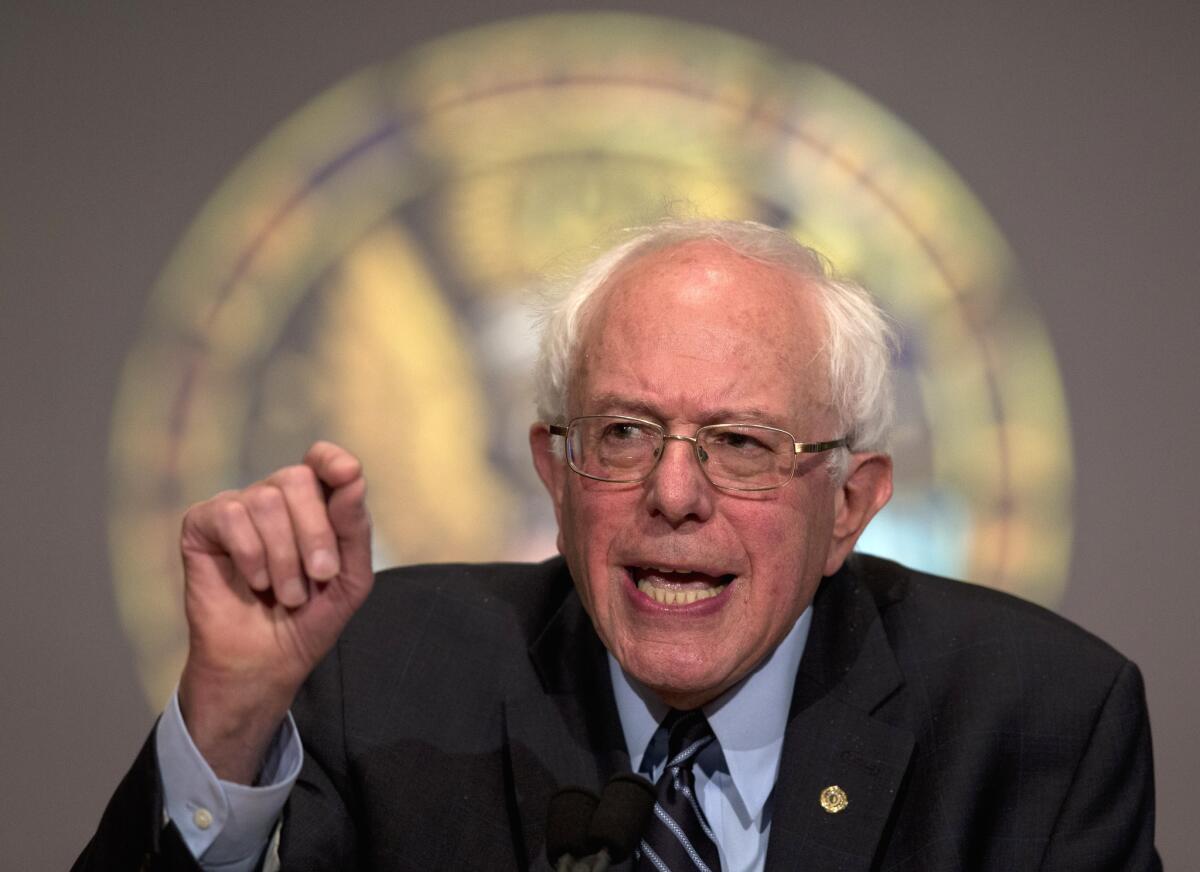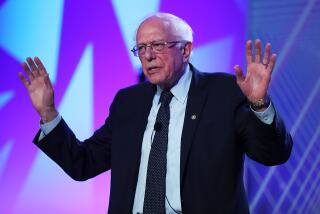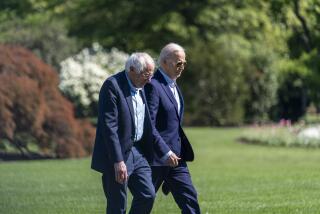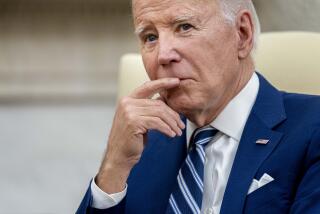Bernie Sanders invokes FDR in explaining socialism as ‘foundation of middle class’

“I don’t believe in some foreign ‘ism,’ but I believe deeply in American idealism,” Democratic presidential candidate Sen. Bernie Sanders said in a speech at Georgetown University.
- Share via
Reporting from Washington — Bernie Sanders has been an unapologetic socialist for his entire political career, and Vermonters have loved him for it.
But could the rest of the nation?
On Thursday, Sanders set out to explain why it should. In a speech at Georgetown University that marked a defining moment in his campaign for the Democratic Party’s presidential nomination, the independent senator from Vermont presented a tutorial on his brand of democratic socialism that was part defiant call to action and part history lesson.
In signature style, Sanders argued it is not he who is the radical — that it is billionaires and their allies who are the threat to the fundamental American values of fairness and compassion.
Sanders positioned himself as the Franklin D. Roosevelt of our time, noting that the president who guided the nation out of the Depression and through most of World War II had an agenda not all that different from his. Roosevelt’s push for Social Security, a minimum wage and the 40-hour workweek, Sanders said, were all attacked as “socialist” threats to the American way of life.
“All of these programs and many more have become the fabric of our nation and, in fact, the foundation of the middle class,” he told an audience of students and faculty packed into an august hall where heads of state and dignitaries speak when on campus. “Today in America, we not only have massive wealth and income inequality, but a power structure built around that inequality which protects those that have the money.”
The speech comes as Sanders is struggling to regain the momentum he built over the summer. Front-runner Hillary Clinton opened up a more than 20-point lead over Sanders a month ago in national polling averages, and the Vermonter has yet to narrow the gap — largely because many Democratic voters question whether he is electable. His self-identifying for decades as a socialist is perceived as heavy baggage in a country where the term, when it does come up in politics, is usually in the form of an attack.
A Gallup poll in June confirmed that the “socialist” label could be a tough one to overcome on election day.
Half of the voters surveyed said they would not vote for a socialist. Despite the Sanders campaign catching fire with liberal Democrats since June, a survey of New Hampshire voters released by WBUR a few weeks ago suggested mainstream voters had not changed their outlook. Half of them still said they would not vote for a socialist, though that total dropped to 40% when the voters were asked about voting for a “democratic socialist,” which is how Sanders describes himself.
Sanders has been asked repeatedly on the campaign trail how he would overcome the problem with his brand. In a debate last month, he assured nervous Democrats that Americans would embrace democratic socialism once he had a chance to fully explain it — as he went on to do in the Georgetown speech.
Sanders invoked the “second bill of rights” that Roosevelt laid out in a 1944 address, in which he warned that, as Sanders said, true freedom does not occur without economic security. Sanders described it as one of the most important yet overlooked addresses of the Roosevelt era.
“People are not free … when they are unable to feed their family,” he said. “They are not truly free when they are unable to retire with dignity. They are not truly free when they are unemployed or underemployed or when they are exhausted by working 60 or 70 hours a week.”
He argued the same theme was at the root of the advocacy of the Rev. Martin Luther King Jr., President Lyndon B. Johnson and Pope Francis, all of whom he argued could also be labeled democratic socialists.
“I don’t believe in some foreign ‘ism,’ but I believe deeply in American idealism,” Sanders said, a response to critics who accuse of him of trying to overlay an approach better suited to Denmark and Sweden on America’s political system.
Throughout the speech, the senator was characteristically stubborn in clinging to the label that has become a political liability.
He expressed bewilderment that his embrace of free public education, universal healthcare and an economic system that does not concentrate so much wealth among so few would be perceived as radical. The goals are in keeping with the American tradition of such programs as Social Security and Medicare, he said, and the rest of the industrialized world operates that way.
“The next time you hear me attacked as a socialist,” Sanders said, “remember this: I don’t believe government should take over the grocery store down the street or own means of production. But I do believe the middle class and working class of this country who produce the wealth of this country deserve a decent standard of living, and their incomes should go up and not down.”
Twitter: @evanhalper
ALSO
Why fewer Mexicans are leaving their homeland for the U.S.
STD cases reaching all-time highs in U.S., California and L.A. County
Mystery deepens for burning SUV with 3 bodies: 2 men died of gunshots, police say
More to Read
Get the L.A. Times Politics newsletter
Deeply reported insights into legislation, politics and policy from Sacramento, Washington and beyond. In your inbox three times per week.
You may occasionally receive promotional content from the Los Angeles Times.











